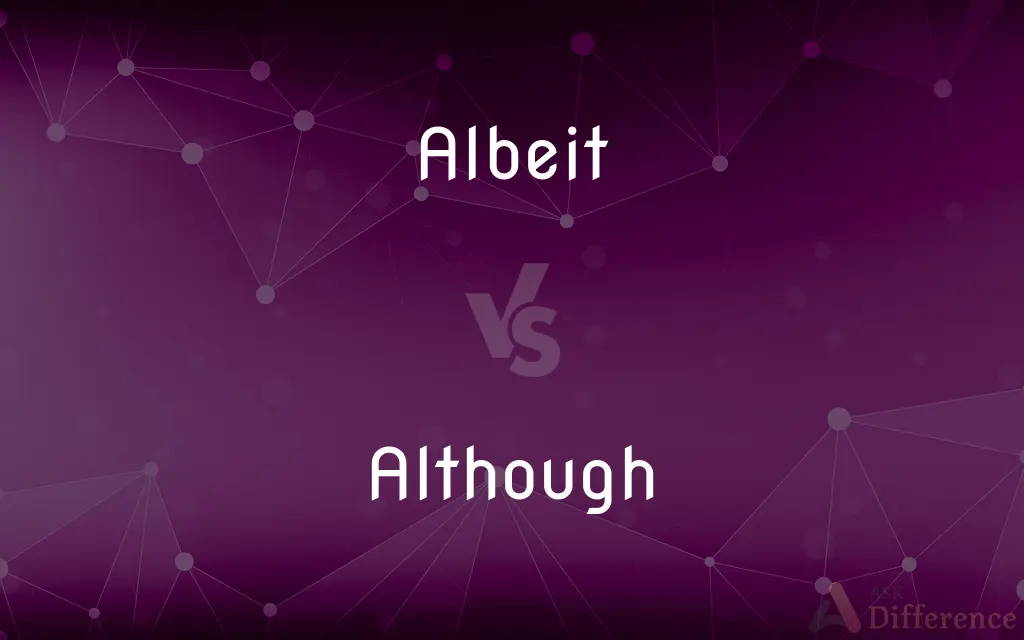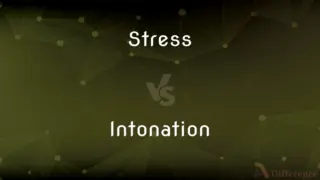Albeit vs. Although — What's the Difference?
By Tayyaba Rehman & Urooj Arif — Updated on March 27, 2024
Albeit conveys concession in a more formal or literary tone, while although is used more broadly in everyday language to introduce a contrasting idea.

Difference Between Albeit and Although
Table of Contents
ADVERTISEMENT
Key Differences
Albeit is a conjunction used to introduce a concessive clause, often in a more formal or literary context. It signifies a recognition of the limitations of the preceding statement, adding a contrasting point without negating the initial assertion. For example, "He accepted the job, albeit with some hesitation," acknowledges acceptance while noting hesitation. Whereas, although is a more commonly used conjunction that introduces a contrast or exception to the main clause. It's versatile and fits naturally in both formal and informal settings. For instance, "Although it was raining, they decided to hike," highlights the decision to hike despite the rain.
Both albeit and although serve to introduce contrasting ideas, but albeit tends to be used more specifically to modify a noun or noun phrase directly. It's often part of a larger sentence construction that aims to refine or limit a statement without completely countering the initial premise. On the other hand, although can introduce a wide range of contrasting clauses and is used more broadly to juxtapose two ideas or facts, making it a more versatile choice in everyday language.
The choice between albeit and although can also reflect the tone and style of the writing. Albeit, with its formal tone, is particularly suited for written texts that aim for a certain level of sophistication or when the author wishes to emphasize the concession being made. Although, being more common and less formal, is suitable for a wide array of contexts, from casual conversations to academic writing, making it a more universally applicable option.
In practice, albeit is less common in everyday speech and is more likely to be found in written texts, especially those of a more formal or academic nature. Although, due to its versatility and straightforwardness, is widely used across spoken and written English, embodying a broader range of contrasting situations and ideas.
The use of albeit can add a nuanced layer to a statement, suggesting a finer point of concession within a specific aspect of the statement. It's particularly effective in situations where the writer or speaker wants to acknowledge a minor exception or limitation. Although, by contrast, sets up a more direct opposition or contrast, often introducing a clause that stands in more evident contradiction to the main statement.
ADVERTISEMENT
Comparison Chart
Function
Introduces a concessive clause, often modifying a noun or noun phrase.
Introduces a contrasting clause more broadly.
Context
More formal or literary.
Suitable for both formal and informal contexts.
Usage
Less common in everyday speech, more in writing.
Widely used in both speech and writing.
Tone
Conveys a formal or sophisticated tone.
Versatile, fits a wide range of tones.
Contrast Level
Suggests a finer point of concession within a specific aspect.
Sets up a direct opposition or broader contrast.
Compare with Definitions
Albeit
Conveys sophistication.
The film was a success, albeit a modest one.
Although
Introduces wider contrasting ideas.
Although it was expensive, it was worth the cost.
Albeit
Often modifies a noun phrase.
It was a beautiful, albeit cold, morning.
Although
Fits a broad range of contexts.
Although tired, he continued working.
Albeit
More frequently found in writing.
He offered a solution, albeit an imperfect one.
Although
Suitable across various tones.
Although new, the car had several issues.
Albeit
Acknowledges limitations without negation.
She agreed, albeit reluctantly, to the terms.
Although
Highlights a clear contrast.
Although she practiced, she did not win.
Albeit
Preferred in formal or literary contexts.
The journey was joyful, albeit short-lived.
Although
Freely used in speech and writing.
Although the sun was shining, it was still cold.
Albeit
Even though; although; notwithstanding
Clear albeit cold weather.
Although
In spite of the fact that; even though
Although the sun was shining it wasn't that warm
Although small, the room has a spacious feel
Albeit
Although, despite (it) being.
Although
Regardless of the fact that; even though
Although the room is big, it won't hold all that furniture.
Albeit
Even though; although; notwithstanding.
Albeit so masked, Madam, I love the truth.
Although
But; however
He says he has a dog, although I've never seen it.
Although
Though, even though, in spite of or despite the fact that: introducing a clause that expresses a concession.
Although it was very muddy, the football game went on.
The patients, (al)though getting stronger, will not come off their medications.
Although
But, except.
It was difficult, although not as difficult as we had expected.
Although
Grant all this; be it that; supposing that; notwithstanding; though.
Although all shall be offended, yet will not I.
Although
Despite the fact that;
Even though she knew the answer, she did not respond
Common Curiosities
Can "although" and "albeit" be used interchangeably?
While they both introduce contrasting ideas, their use is not always interchangeable due to differences in formality and specific grammatical structures.
Is "albeit" common in casual conversation?
No, "albeit" is less common in casual conversation and more typical in formal writing or literature.
Why might a writer choose "albeit" over "although"?
A writer might choose "albeit" for a more formal tone or to emphasize a particular concession within a statement.
Can "albeit" start a sentence?
Typically, "albeit" is not used to start a sentence; it's used within a sentence to introduce a concessive clause.
What is the main use of "albeit"?
"Albeit" is used to introduce a concession or limitation in a more formal or nuanced manner.
How does "although" impact the structure of a sentence?
"Although" introduces a clause that provides a contrast to the main clause, often leading to a more direct opposition or broader comparison.
Is "although" appropriate for academic writing?
Yes, "although" is appropriate and widely used in academic writing to introduce contrasting points or arguments.
What is a common mistake when using "albeit"?
A common mistake is using "albeit" interchangeably with "although" without considering the formality or specific grammatical construction of the sentence.
How do "albeit" and "although" influence readability?
"Albeit" may make a text seem more formal or complex, while "although" is more universally understood and can enhance readability by clearly presenting contrasting ideas.
Does the use of "albeit" affect the tone of a document?
Yes, using "albeit" can lend a more formal or sophisticated tone to a document compared to "although."
Share Your Discovery

Previous Comparison
Aginator vs. Paginator
Next Comparison
Stress vs. IntonationAuthor Spotlight
Written by
Tayyaba RehmanTayyaba Rehman is a distinguished writer, currently serving as a primary contributor to askdifference.com. As a researcher in semantics and etymology, Tayyaba's passion for the complexity of languages and their distinctions has found a perfect home on the platform. Tayyaba delves into the intricacies of language, distinguishing between commonly confused words and phrases, thereby providing clarity for readers worldwide.
Co-written by
Urooj ArifUrooj is a skilled content writer at Ask Difference, known for her exceptional ability to simplify complex topics into engaging and informative content. With a passion for research and a flair for clear, concise writing, she consistently delivers articles that resonate with our diverse audience.















































